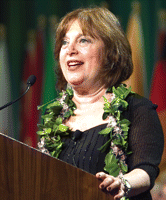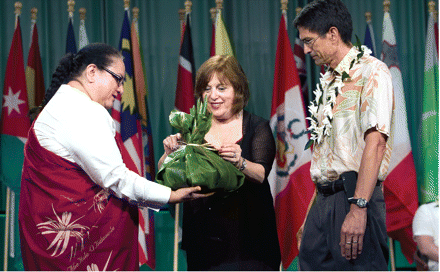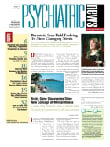Outgoing APA President Carol Bernstein, M.D., is looking back on a presidential year that was spent looking to the future.
A lifelong educator, Bernstein has had a unique focus on the young people who will be the future leaders of psychiatry and APA. At the Opening Session of this year's APA annual meeting last month in Honolulu, she recounted her efforts to reach out to residents and early career psychiatrists and outlined the achievements of a presidential year devoted to "Transforming Mental Health Through Leadership, Collaboration, and Discovery" (see
Bernstein's Presidential Themes, Initiatives).
"For the first time, there are many generational cohorts in the workplace," she said. "Our patients are living longer with chronic illness, and our treatments are focused on recovery and rehabilitation rather than simply episodes of illness. The younger generations of psychiatrists and patients have fundamentally different approaches to authority, to change, to work-life balance, and to communication than those of us currently in leadership positions in APA, as well as those of us who are leading other efforts in education, in the clinical setting, and in research.
"In speaking around the country to many different audiences, I have become persuaded that understanding the sociological context of generational differences is essential as we move forward into the 21st century," she said. "Some have commented that these generational differences will dissipate as the generation Xers and the millennials age—that the ‘disconnect’ between the baby-boom and World War II generations and the two subsequent cohorts has more to do with differences between youth and age and experience than fundamental shifts in perspective.
"I would counter that the changes in communication styles and modalities that we have seen and are continuing to see will dramatically alter our perspectives on work-life balance and will revolutionize how we take care of our patients."
Bernstein has spent the past two years hosting "town hall meetings" with residents and early career psychiatrists. And she has urged every academic department to consider devoting one grand-rounds program each year to informing faculty and residents about APA's strategic agenda and ways to become involved in advocacy, education, and outreach in their local areas.
"Such presentations would provide an annual opportunity to link the academic world with the clinical community that it serves," she said. "Local and national APA leaders could be invited to meet with young psychiatrists, and these events would provide additional forums to discuss precisely how to bring research from the bench to the bedside and how to partner successfully in our new environment."
Bernstein's presidential year has also been a critical one in the evolution of the new DSM-5, to be published in 2013.
"The 13 work groups have completed their initial reviews of potential changes to the DSM, which, thanks to extraordinary advances in technology, will be a ‘living document’—one that we will have the capacity to update on a regular basis as we discover more about the causes and treatments of psychiatric disorders," Bernstein told psychiatrists and others at the Honolulu meeting. "Preliminary recommendations of the DSM-5 Task Force and the work groups were posted on the Web a little over a year ago. Comments on the proposed criteria from all over the world were reviewed extensively by the work groups and incorporated into our ongoing decision making."
At Bernstein's direction, the Board of Trustees established a Scientific Review Committee chaired by Kenneth Kendler, M.D., and Robert Freedman, M.D., to evaluate the science that has informed new proposals for DSM. "The assessments of the [review committee] are being provided to the work groups and the Board to continue to ensure that the highest levels of rigor and assessment are provided for DSM development," she said. "Field trials have begun across the country in 11 academic centers to study the reliability and clinical utility of potential changes in diagnosis."
She also noted that extraordinary efforts have been made to gather public input about the DSM revision, with nearly 9,000 comments and 50 million hits on the Web site since draft criteria were posted in April 2010.
"Our efforts to incorporate feedback in such an open and transparent way are unprecedented in the history of the DSM," Bernstein emphasized. "The manual will serve multiple purposes for different audiences. Fundamentally, it is a nosological text that is used by clinicians throughout the world to diagnose those suffering from psychiatric disorders.
"In some areas, we are closer to understanding the etiology of the conditions affecting our patients, and in other areas we are limited to identifying symptom clusters that track together and where similar clinically useful techniques can be applied in treatment."
In addition, she pointed out, "the DSM provides a research framework for the scientific community so that it can continue to study psychiatric conditions to elucidate our understanding of etiology and clinical course to advance the development of new and more effective treatments."


